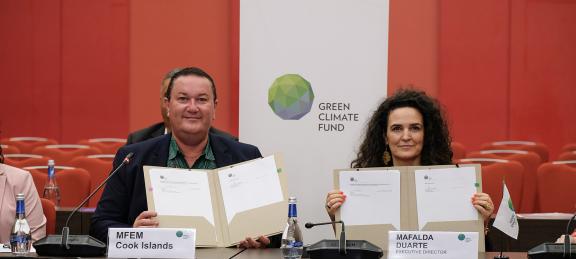Incheon, Republic of Korea – The first single-country project in the Cook Islands took 20 days from GCF Board approval to the first disbursement of funding. The USD 13.4 million project, of which USD 12.5 million is funded by the Green Climate Fund (GCF), focuses on improving health outcomes for all Cook Islanders and was developed by the government, with support from GCF through the Simplified Approval Process (SAP).
With higher temperatures increasing the spread of disease-causing pathogens and many infectious diseases, this project will bolster the climate resilience of national health systems in the Cook Islands. The Cook Islands face a triple health challenge – communicable diseases, non-communicable diseases, and other health impacts due to climate change – resulting in high rates of malnutrition, sickness, and death.
Climate-related disasters are further disrupting national healthcare services and disproportionately affecting vulnerable groups across the country. This project targets the most vulnerable, including people who are chronically ill, pregnant women and those living on the remote outer islands who struggle to access healthcare services.
“Akamatutu’anga To Tatou Ora’anga Meitaki (ATOM): Building a healthy and resilient Cook Islands community – one block at a time" will enhance the national health system and climate resilience of health services. It will support approximately 30 communities and 22 health facilities or emergency centres in 12 inhabited islands of the 15 islands, including the 11 outer Pa Enua islands, and the main island of Rarotonga.
Executive Director of the Green Climate Fund, Mafalda Duarte said: “Providing support for Small Island Developing States to adapt to climate change is a key priority for GCF. I’m delighted that we’ve been able to rapidly transfer the first tranche of funding to this project in 20 days, a record for GCF. This demonstrates GCF is delivering faster climate action and setting new benchmarks. There are several firsts for this project – it’s the first project solely targeting climate and health in the Pacific region; and it’s the first single-country project to be rolled out by the Ministry of Finance and Economic Management for the Cook Islands. It’s great to see a project come into fruition through a completely country-driven approach using the full suite of GCF support such as our Readiness and Project Preparation grants. I congratulate the Prime Minister, Mark Brown, his team, and all Cook Islanders for this accomplishment.”
Garth Henderson, Financial Secretary, Head of the Ministry of Finance and Economic Management said: “This achievement is a testament to our unwavering dedication to climate action. Our steadfast commitments not only align seamlessly with the GCF Readiness and Preparatory Support Programme objectives, but also embodies the GCF core principle of country ownership. This success underscores the power of collaboration and leadership within our Accredited Entity, as we work closely with our local agencies to strengthen their capacity. The journey of this project has been a profound learning curve for us as a Direct Access Entity and our executing entities alike, while it took time to secure our first project, what we gained was invaluable: increased knowledge, capacity, and capability among our people. This milestone marks a significant leap forward in our collective efforts to drive meaningful climate action within our nation and beyond.”

Mafalda Duarte, GCF Executive Director (right) and Mani Mate, Director of the Development Coordination Division, MFEM (left) at the 6 March 2024 project agreement signing ceremony that took place on the sidelines of the 38th Meeting of the GCF Board in Kigali, Rwanda. Photo: GCF
ATOM was developed through a partnership between the Cook Islands and GCF. Through GCF’s Readiness Programme and Project Preparation Facility, the Cook Islands conducted health assessments and pre-feasibility studies to shape the project design and implementation –ensuring the project will be impactful, effective, and meet the needs of the people.
The project relies upon the technical expertise in the Ministry of Health Te Marae Ora and the Cook Islands Investment Corporation, as well as other partners, including the Ministry of Education, the Cook Islands Red Cross Society, and the Ministry of Agriculture. The project’s knowledge management component will be shared with the wider Pacific community, to build the climate resilience of health systems and services in other small islands states.
Previously, an adaptation project in Micronesia was the fastest GCF project to be approved – from project sign-off to the first transfer of GCF funding – taking 36 days.
Notes to editors:
- The Green Climate Fund (GCF) is the world’s largest dedicated climate fund. GCF’s mandate is to foster a paradigm shift towards low emission, climate-resilient development pathways in developing countries.
- GCF has over 250 projects, a portfolio of USD 13.9 billion (USD 53 billion including co-financing) delivering transformative climate action in more than 129 developing countries.
- GCF also has a readiness support programme that builds capacity and helps countries develop long-term plans to fight climate change.
- GCF is an operating entity of the financial mechanism of the United Nations Framework Convention on Climate Change (UNFCCC) and serves the 2015 Paris Agreement, supporting the goal of keeping average global temperature rise well below 2°C.
- GCF Cook Islands country page.